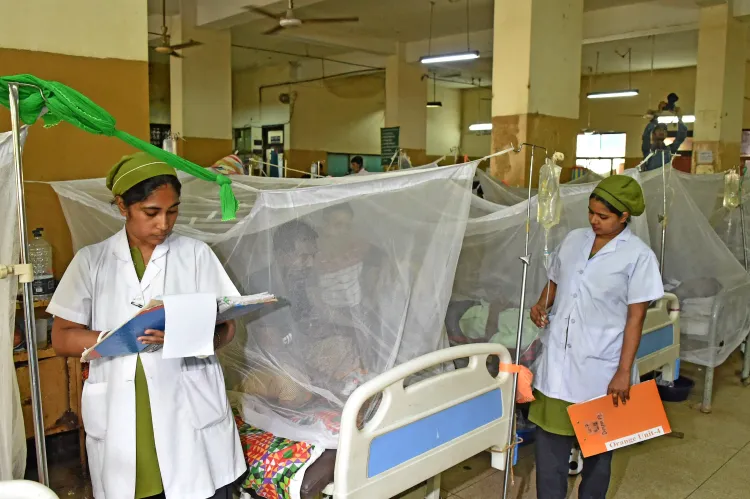Has dengue claimed two more lives in Bangladesh? 2025 death toll rises to 259

Synopsis
Key Takeaways
- Four additional dengue deaths reported in Bangladesh, total fatalities reach 259.
- 803 new cases admitted in the last 24 hours.
- Current hospitalizations total 2,648 patients.
- Early diagnosis and treatment are crucial for survival.
- Public awareness and preventive measures are essential.
Dhaka, Oct 23 (NationPress) In the last 24 hours, four individuals succumbed to dengue in Bangladesh, leading to a total of 259 fatalities in 2025, as reported until 8 am Dhaka time on Thursday.
During this timeframe, 803 new admissions were recorded, bringing the total dengue cases in the nation to 63,170, according to Bangladesh's The Daily Star. Out of these cases, 41,638 patients have been discharged from hospitals.
The Directorate General of Health Services (DGHS) reported that two deaths occurred in Dhaka City, with one each in the Sylhet and Mymensingh divisions.
Currently, 2,648 dengue patients are still undergoing treatment in various hospitals across Bangladesh.
On October 9, DGHS Director General Abu Jafor mentioned that the number of dengue cases in 2025 has exceeded that of the previous year; however, the death rate is comparatively lower.
During a press briefing regarding the ‘Typhoid Vaccination Campaign-2025’ at the Health Ministry, Abu Jafor stated: "This year, the number of dengue infections has surpassed last year, but the death rate relative to infections is lower," as reported by United News of Bangladesh (UNB).
He emphasized the importance of controlling mosquito breeding and eliminating larvae to prevent dengue. "Individuals must utilize mosquito nets and adopt protective measures. These actions largely fall on personal responsibility. Without them, eradicating dengue will be exceedingly challenging,” he remarked.
"Our data indicates that over 50 percent of dengue-related fatalities in hospitals occur on the very first day of admission. This points to a delay in seeking medical care. We are committed to ensuring effective management in hospitals,” he added.
Abu Jafor also highlighted the significance of early diagnosis, noting that dengue can be treated at home with appropriate medical attention if detected early. He attributed the rising death rate to a lack of awareness, negligence, and delays in seeking care.
Dengue is a viral infection caused by the dengue virus (DENV), transmitted through the bites of infected mosquitoes. It is prevalent in tropical and sub-tropical regions globally, particularly in urban and semi-urban locales, according to the World Health Organization (WHO). Prevention and control hinge on effective vector management. While there is no specific treatment for dengue, early detection and prompt medical care significantly reduce the risk of severe complications.










